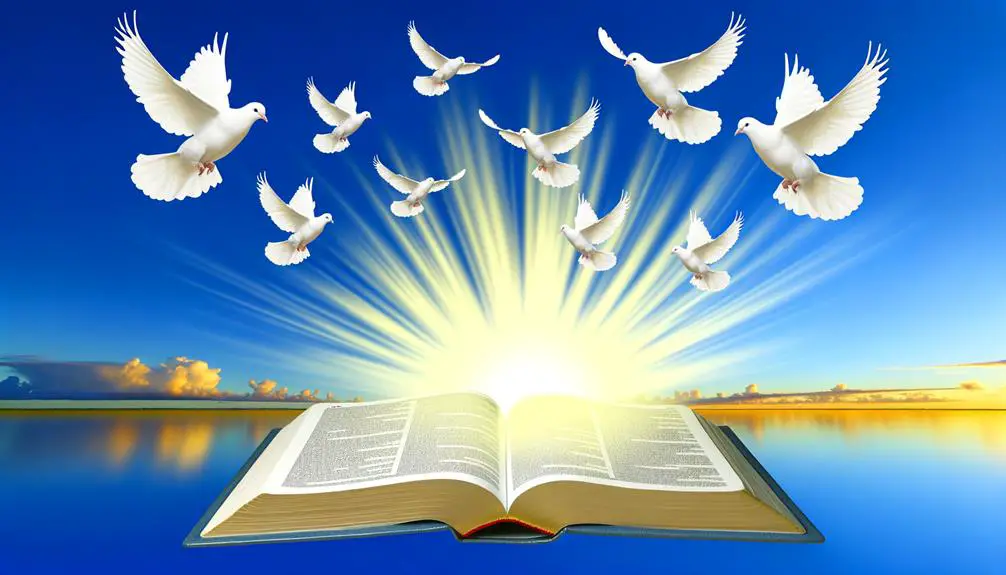Plunge into the depths of biblical freedom, where spiritual liberation intertwines with ethical journeys, urging a deeper exploration of its profound implications.

Freedom in the Bible Meaning
In the Bible, freedom isn't just about physical release; it delves deeper into spiritual and ethical domains. You'll find it rooted in stories like the Exodus, where liberation from Egypt symbolizes freedom from oppression. In the New Covenant, Paul emphasizes freedom as a release from sin's bondage through faith in Christ. These narratives aren't merely historical accounts; they reflect a broader, communal journey toward spiritual autonomy, justice, and peace. The Scriptures craft a vision where legal and ethical norms are balanced with spiritual liberation. With each exploration of biblical texts, new dimensions of this multifaceted concept could reveal themselves to you.
Key Takeaways
- Biblical freedom often symbolizes liberation from physical and spiritual bondage, as exemplified in the Exodus narrative.
- Jesus' teachings highlight spiritual liberty, emphasizing freedom from sin and inner transformation.
- Paul teaches that spiritual freedom is attained through faith in Christ, transcending legalistic adherence to the law.
- Biblical freedom involves a community aspect, promoting empathy, support, and collective well-being.
- The concept extends to eschatological promises of eternal freedom and salvation, reflecting ultimate liberation and peace.
Historical Roots of Biblical Freedom

The concept of freedom in the Bible has its roots deeply embedded in ancient Hebrew culture and religious practices. As you explore its historical context, it's important to recognize how these roots were intertwined with the cultural and political landscapes of the time, including the significant Roman influence.
Freedom in biblical times wasn't an abstract ideal but was deeply practical, influenced heavily by the socio-political dynamics of ancient Near Eastern societies. The Hebrew notion of freedom was fundamentally about liberation from bondage and oppression, a theme recurrent throughout their history. However, under Roman rule, this concept evolved. The Romans brought with them a legalistic framework that redefined personal and communal rights, which in turn influenced the Jewish understanding of freedom.
This shift is evident when you consider the Roman impact on local laws and practices. Roman legal concepts such as 'ius civile' were alien to Hebrew tradition but began to permeate Jewish thought, particularly among the elite. This intersection of Roman and Hebrew ideas created a unique cultural context in which biblical interpretations of freedom were framed. Therefore, understanding this blend of influences is key to grasping the full spectrum of freedom as articulated in the biblical texts.
Freedom in the Exodus Story
Reflecting on the evolution of freedom under Roman influence, you'll find the Exodus story offers a compelling contrast, where liberation from Egyptian bondage encapsulates a pivotal theological and cultural motif. This narrative isn't just about physical liberation; it's also a profound exploration of moral and spiritual freedom under Moses' leadership.
As you explore further, you'll see how Pharaoh's oppression represents more than just political tyranny; it symbolizes humanity's broader struggle against forces that constrain spiritual and personal growth. Moses, as a leader, doesn't merely confront Pharaoh; he challenges the very notion of despotism—emphasizing a liberation theology that resonates through centuries.
This story's richness lies in its layers of meaning—freedom isn't simply the crossing of the Red Sea, but the ongoing journey towards a promised, yet often elusive, land of autonomy and justice. It invites you to ponder how freedom is a complex, often arduous, negotiation between power, faith, and identity. Therefore, the Exodus isn't just a tale from the past; it's a continuous call to evaluate the chains that bind us and the leaders we choose to follow in our own quests for freedom.
Prophetic Visions of Liberation

As you explore the prophetic visions of liberation in the Bible, consider how these narratives extend and deepen the concept of freedom introduced in the Exodus story. Isaiah's vision of peaceful redemption, for instance, offers a broader, more inclusive understanding of liberation, transcending physical emancipation to include spiritual renewal. Similarly, Daniel's portrayal of kingdom freedom not only reinforces this expansive view but also integrates divine sovereignty with human liberation, suggesting a dual process of freedom that engages both the heavenly and the earthly domains.
Exodus: Liberation Prototype
In examining the Exodus story, it's evident that this narrative served as a foundational prototype for prophetic visions of liberation in the Bible. Through Moses' leadership, you witness a profound transformation from oppression to freedom. His confrontations with Pharaoh exemplify defiance against tyrannical power, underscoring a divine mandate for liberation. This story isn't just historical; it's a perpetual reminder of the struggle for freedom and justice.
Aspect |
Description |
|---|---|
Moses' Leadership |
Guided the Israelites with courage and faith. |
Pharaoh's Defiance |
Resisted liberation, symbolizing oppression. |
Divine Mandate |
Highlighted by the plagues and Red Sea crossing. |
Reflect on this: the Exodus isn't merely an ancient tale but a timeless echo of liberation, urging you to seek justice in your world today.
Isaiah's Peaceful Redemption
Moving from the tumultuous liberation in Exodus, Isaiah presents a vision of peaceful redemption where justice and righteousness flourish. Isaiah's prophecies diverge notably from earlier narratives, emphasizing a future where conflicts resolve not through force, but through divine intervention characterized by fairness and moral integrity. You'll notice Isaiah employs peaceful metaphors, like the wolf living with the lamb, to illustrate a harmonious existence achievable under God's sovereign rule. These images offer you a glimpse into a world where freedom is not just the absence of oppression, but the presence of equitable conditions for all. Reflecting on these visions, you're invited to contemplate how true liberation intertwines with universal peace and justice, suggesting a profound transformation of societal structures.
Daniel's Kingdom Freedom
Daniel's visions unfold a transformative concept of freedom, where divine sovereignty establishes a domain marked by enduring justice and righteousness. In your journey through these prophetic narratives, you'll notice how interpretive dreams play a pivotal role. Daniel's ability to decipher these dreams not only positions him as a conduit of divine wisdom but also as a liberator within the narrative. The lion's den symbolism further enriches this theme. As Daniel survives the den, it's not just a personal triumph but a prophetic sign of God's power to liberate and uphold justice even in oppressive regimes. This story invites you to reflect on the broader implications of spiritual and societal liberation, challenging you to contemplate what true freedom under divine governance might entail.
Jesus: Preacher of Freedom

Jesus' teachings often emphasized the transformative power of spiritual liberty, urging you to contemplate the depths of freedom beyond mere physical or political constraints. His approach was not just about liberation from worldly oppression but also about achieving inner freedom through spiritual understanding and faith. This concept of freedom is vividly illustrated in his miracle stories and parable teachings, where the breaking of physical and spiritual bonds offers a new vision of liberation.
Aspect of Freedom |
Example from Teachings |
|---|---|
Miracle Stories |
Healing of the blind man (John 9) symbolizes the restoration of spiritual sight, freeing individuals from the darkness of ignorance. |
Parable Teachings |
Parable of the Prodigal Son (Luke 15) explores the theme of redemption and self-liberation through repentance and forgiveness. |
| Personal Transformation | The call to 'born again' (John 3) emphasizes a fundamental transformation of self, aligning one's life with divine principles.
In these narratives, freedom isn't simply an external state but an internal awakening. Jesus' discourse invites you to rethink what it means to be free, suggesting that true freedom is found in the surrender to higher divine truths and in the emancipation from personal and communal sin. This multi-dimensional view challenges you to explore freedom not as a given right but as a spiritual journey.
Paul's Letters on Spiritual Freedom
Paul's epistles articulate a profound understanding of spiritual freedom, emphasizing that true liberation comes through faith in Christ and the grace of God. You'll find that Paul often contrasts the state of spiritual bondage with the liberating power of grace empowerment. His letters explore the nuances of being enslaved to worldly principles versus living in the freedom bestowed by Christ's sacrifice.
In his dialogues, particularly in letters like Galatians and Romans, Paul expounds on the concept that spiritual bondage isn't merely a physical or external condition; it's a profound internal struggle with sin and legalism. He argues that the law, while holy, acted as a custodian until Christ came, so that we might be justified by faith. Now, through faith, you're no longer under a schoolmaster. This shift from law to grace, from bondage to freedom, is central to understanding Paul's perspective on spiritual liberty.
Reflect on how Paul describes grace as not just a rescue or escape, but an empowerment. It's by grace that you're able to lead a life pleasing to God, free from the yoke of the law and the prior dictates that once defined righteousness. This empowerment is foundational to living out the true Christian freedom Paul preaches.
Freedom From Sin and Death

While spiritual freedom encompasses various dimensions, it importantly involves liberation from sin and death, a theme central to Christian theology. This liberation is not merely a philosophical abstraction but a tangible reality that you can experience through the grace empowerment and the redemption process offered in the biblical narrative.
The Bible elucidates that this freedom is not achieved by human efforts but through divine intervention. Here, grace becomes not just a facilitator but the very means of your liberation:
- Grace empowerment: It's by grace that you're enabled to overcome the bondage of sin. This unmerited favor is essential for breaking the chains that bind humanity to its fallen nature.
- Redemption process: Through Christ's sacrifice, you are offered a path to redemption, a journey from death to life. This process transforms your spiritual state, reinstating you to a life marked by freedom.
- Transformation of identity: In Christ, you become a new creation, old things pass away, and all things become new. This identity shift is vital for understanding and living out your freedom.
Reflect on how these elements actively reshape your understanding of spiritual freedom, moving you from a state of bondage to one of liberated living.
The Role of the Law in Freedom
In exploring the role of the Law, it's important to understand how it serves both as a guide to freedom and a mirror reflecting our shortcomings. The Law, as presented in the Bible, isn't just a set of vital rules but a structured way to promote harmony and ethical behavior. It's through these legal constraints that societal obedience is nurtured, leading to a more orderly community where freedom can truly flourish.
The Law points out where you fall short, not to condemn you, but to steer you back to the path of righteousness. This correctional feature is essential because it not only highlights personal failings but also underscores the collective moral standards essential for sustaining societal well-being.
Here's a breakdown of how the Law functions in these dual roles:
Function of the Law |
Impact on Individual and Society |
|---|---|
Guiding Behavior |
Ensures personal and communal alignment with ethical standards |
Reflecting Shortcomings |
Helps individuals recognize and rectify their moral lapses |
Promoting Order |
Facilitates a stable environment, essential for exercising true freedom |
Through this lens, you can see that the Law is foundational to understanding and achieving biblical freedom. It scaffolds the structure within which freedom, tempered by responsibility, can exist and thrive.
Biblical Freedom in Community Life

Biblical freedom within community life necessitates a mutual commitment to uphold values that honor both individual and collective well-being. This nuanced understanding of freedom involves more than personal liberation; it requires active participation in the health and growth of your community. You're called to engage in community practices that reflect both justice and mercy, showing that spiritual freedom doesn't exist in isolation but flourishes within the network of relational responsibilities.
In this context, consider how:
- Support and accountability sustain each member, ensuring that freedom leads to constructive rather than destructive outcomes.
- Empathy and compassion guide interactions, making sure that no one is marginalized or oppressed within the community.
- Collective decision-making respects individual voices while aiming for the common good, embodying the principle that freedom for one should enhance freedom for all.
Such principles are crucial because they help balance personal liberties with communal obligations. You're not just free to act but are free to serve, contribute, and uplift. Reflecting on these dynamics, you can see how biblical freedom isn't merely about individual rights but about fostering an environment where all can thrive. This is the heart of living freely within a biblical framework—where your freedom and mine are interdependent, woven through our shared lives and shared faith.
Future Promises of Eternal Freedom
As you explore the Biblical narrative, you'll find that the concept of eternal freedom is not just a fleeting promise but a profound assurance of eternal life and unending peace. These promises are not merely abstract concepts; they offer a transformative hope that transcends earthly limitations and hardships. Reflect on how these assurances might reshape your understanding of freedom, not as a temporary state, but as an enduring reality anchored in divine providence.
Eternal Life Assurance
Eternal life, assured through Scripture, offers believers a future of boundless freedom from sin and death. This profound promise not only secures your salvation certainty but also epitomizes death transcendence, where the finality of physical death is overcome by the promise of eternal life. Reflect on the implications of this assurance:
- Salvation Certainty: You're promised a salvation that's secure, unshakable by earthly trials.
- Death Overcoming: Death becomes a mere passage, not an end, leading to eternal existence.
- Liberation from Sin: Eternal life means freedom from the bondage of sin, enabling a life aligned with divine purity.
These elements collectively forge a panoramic view of eternal freedom, ensuring you're not just surviving but thriving beyond temporal confines.
Unending Peace Prospect
The prospect of unending peace, promised in Scripture, represents a future where believers are freed from the turmoil of earthly existence. This vision of perpetual harmony isn't merely about the absence of conflict; it's a profound state of lasting serenity that permeates every aspect of existence. You'll find that biblical texts often juxtapose current suffering with the promise of an eternal peace that transcends human understanding.
Reflecting on these promises, you're invited to ponder how this eternal freedom shapes your understanding of divine justice and mercy. It's a transformative concept: the struggles and strife that mark our days are but temporary when viewed through the lens of scriptural promises. This eternal perspective not only offers comfort but challenges you to live in a way that aligns with this unending peace.
Frequently Asked Questions
How Do Modern Scholars Interpret Freedom in the Bible?
You'd find that modern scholars often interpret biblical freedom as theological autonomy and scriptural liberation, reflecting on historical contexts and evolving interpretations to understand how these concepts apply today's social and ethical issues.
Are There Contradictions in the Bible Regarding Freedom?
You'll find that scriptural ambiguity and interpretational differences fuel debates about contradictions in the Bible regarding freedom. Scholars analyze texts, often arriving at varied conclusions influenced by historical and cultural contexts.
How Does Biblical Freedom Compare to Modern Political Freedom?
You'll find that freedom's evolution is a universe apart when comparing biblical spiritual freedom to modern political liberty. The former transcends earthly bounds, while the latter navigates the complex terrain of governance.
What Impact Did Biblical Freedom Have on Early Christian Art?
In early Christian art, you'll find artistic symbolism and visual narratives deeply influenced by prevailing cultural and religious themes, reflecting an evolving understanding of spiritual and communal identities through allegorical and metaphorical depictions.
How Do Different Denominations View the Concept of Freedom in the Bible?
Different denominations interpret theological meanings of freedom variably, reflecting their unique doctrinal teachings. You'll find that these interpretations influence both the practice and the preaching within each denominational context, shaping their broader theological discourse.



Sign up